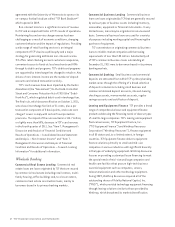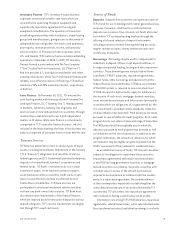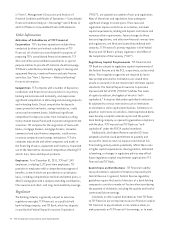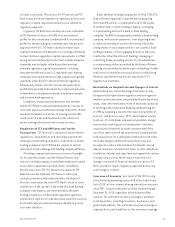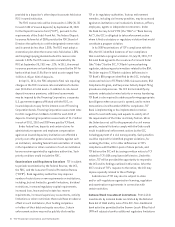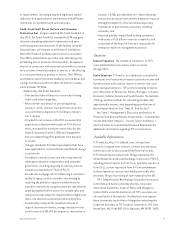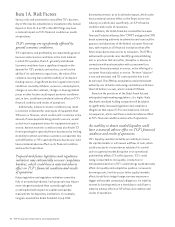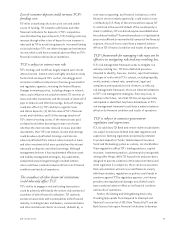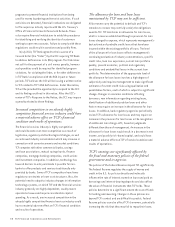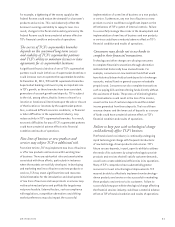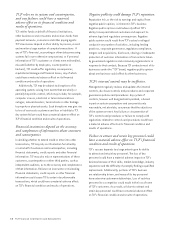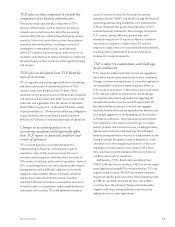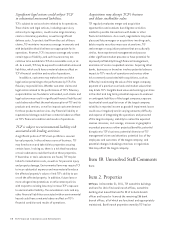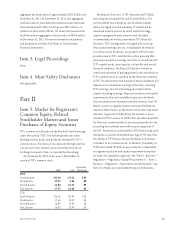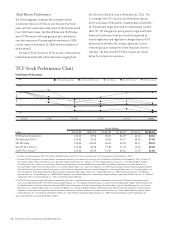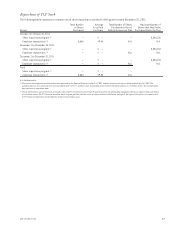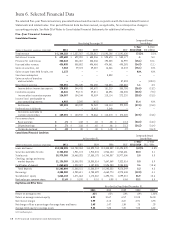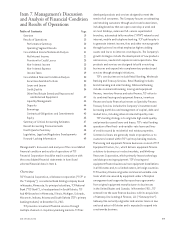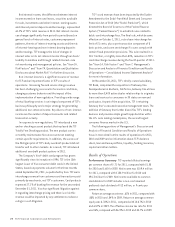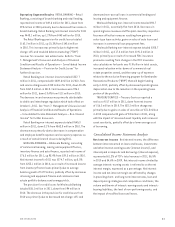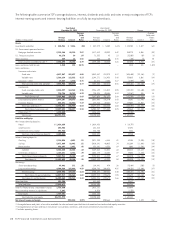TCF Bank 2011 Annual Report Download - page 30
Download and view the complete annual report
Please find page 30 of the 2011 TCF Bank annual report below. You can navigate through the pages in the report by either clicking on the pages listed below, or by using the keyword search tool below to find specific information within the annual report.TCF relies on its systems and counterparties,
and any failures could have a material
adverse effect on its financial condition and
results of operations.
TCF settles funds on behalf of financial institutions,
other businesses and consumers and receives funds from
payment networks, consumers and other paying agents.
TCF’s businesses depend on their ability to process, record
and monitor a large number of complex transactions. If
any of TCF’s financial, accounting or other data processing
systems fail or are otherwise compromised, or if personal
information of TCF’s customers or clients were mishandled,
misused (whether by employees, counterparties or
hackers), TCF could suffer regulatory consequences,
reputational damage and financial losses, any of which
could have a material adverse effect on its financial
condition and results of operations.
Additionally, TCF may be subject to disruptions of its
operating systems arising from events that are wholly or
partially beyond its control, which may include, for example,
computer viruses, electrical or telecommunications
outages, natural disasters, terrorist acts or other damage
to property or physical assets. Such disruptions may give rise
to loss of services to customers and loss or liability to TCF.
Any system failure could have a material adverse effect on
TCF’s financial condition and results of operations.
Financial institutions depend on the accuracy
and completeness of information about customers
and counterparties.
In deciding whether to extend credit or enter into other
transactions, TCF may rely on information furnished by
or on behalf of customers and counterparties, including
financial statements, credit reports and other financial
information. TCF may also rely on representations of those
customers, counterparties or other third parties, such as
independent auditors, as to the accuracy and completeness
of that information. Reliance on inaccurate or misleading
financial statements, credit reports or other financial
information could cause TCF to enter into unfavorable
transactions, which could have a material adverse effect
on TCF’s financial condition and results of operations.
Negative publicity could damage TCF’s reputation.
Reputation risk, or the risk to earnings and capital from
negative public opinion, is inherent in TCF’s business.
Negative public opinion could adversely affect TCF’s
ability to keep and attract customers and expose it to
adverse legal and regulatory consequences. Negative
public opinion could result from TCF’s actual or alleged
conduct in any number of activities, including lending
practices, corporate governance, regulatory compliance,
mergers and acquisitions, disclosure, sharing or inadequate
protection of customer information or from actions taken
by government regulators and community organizations in
response to that conduct. Because TCF conducts most of its
businesses under the “TCF” brand, negative public opinion
about one business could affect its other businesses.
TCF’s internal controls may be ineffective.
Management regularly reviews and updates the internal
controls, disclosure controls and procedures and corporate
governance policies and procedures. Any system of
controls, however well designed and operated, is based
in part on certain assumptions and can provide only
reasonable, not absolute, assurances that the objectives
of the system are met. Any failure or circumvention of
TCF’s controls and procedures or failure to comply with
regulations related to controls and procedures could have
a material adverse effect on its financial condition and
results of operations.
Failure to attract and retain key personnel could
have a material adverse effect on TCF’s financial
condition and results of operations.
TCF’s success depends to a large extent upon its ability
to attract and retain key personnel. The loss of key
personnel could have a material adverse impact on TCF’s
business because of their skills, market knowledge, industry
experience and the difficulty of promptly finding a qualified
replacement. Additionally, portions of TCF’s business
are relationship driven, and many of its key personnel
have extensive customer relationships. Loss of such key
personnel to a competitor could result in the loss of some
of TCF’s customers. As a result, a failure to attract and
retain key personnel could have a material adverse effect
on TCF’s financial condition and results of operations.
12 TCF Financial Corporation and Subsidiaries


